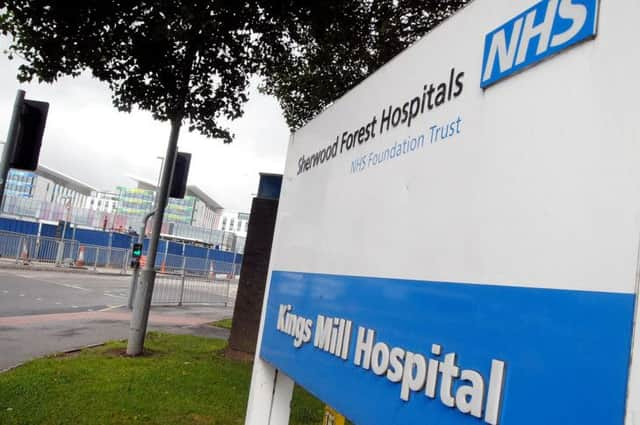Shock surge in booze patients


Following a Freedom of Information Request made by Chad to Sherwood Forest Hospitals NHS Foundation Trust, it has emerged that the number of people needing emergency care because of alcohol has increased from 156 in 2011-12 to 245 in the 2013-13 financial year.
The number of people needing treatment for acute intoxication at the trust, which runs King’s Mill Hospital, Ashfield Health Village and Mansfield Community Hospital, has also increased from 52 to 91 over the same period.
Advertisement
Hide AdAdvertisement
Hide AdPeople requiring treatment for suffering acute withdrawal symptoms from heavy drinking has risen from 73 to 113, while those suffering symptoms of delirium due to alcohol withdrawal has risen from eight to 14, the figures show.
The trust said the admission increase is costing them money and are treating more people out in the community as a way of reducing hospital admissions.
A&E consultant Dr Benjamin Owens told Chad:: “There has been a general rise in the number of emergency attendances at King’s Mill Hospital, including alcohol related conditions. We have robust plans in place to cope with extra demand, but to ensure no patient waits in our emergency department longer than necessary we have introduced an ambulatory care unit. Some conditions may be treated without the need for an overnight stay in hospital. Many patients seen within ambulatory care would have previously received the same treatment as an inpatient. This service provides timely assessment and ensures the best outcome for our patients.”
Under current Department of Health rules, the trust Trust is only paid 30 per cent of the price of an emergency admission above 2008/09 levels and as a result where we have seen growth we are not fully reimbursed for increased activity. The remaining 70 per cent (around £2.2 million this year) is held by the Mansfield and Ashfield Clinical Commissioning Group and invested in other services to try to reduce emergency admissions into the trust, a hospital spokesman told Chad.
Advertisement
Hide AdAdvertisement
Hide AdPeople drinking excessive amounts of alcohol, particularly the issue of pre-loading, where people consume large amounts of cheaper alcohol at home before heading out for a night on the town, is putting pressure on emergency services across the board. And plans are now afoot for a revellers who get drunk before going to Mansfield night clubs to be breathalysed by door staff and turned away if they are too drunk.
The Are You Trollied? Scheme, funded by Mansfield Partnership Against Crime (MPAC), aims to prevent people drinking excessively at home, known as pre-loading, before heading into clubs and pubs.
Acting Chief Inspector Neil Williams said: “This project provides late night businesses with the tools to take responsibility for tackling customers who have the potential to cause them problems.
“We will not tolerate drunkenness in Mansfield’s night time economy and with the breathalyser machines and additional police officers paid for by MPAC we have the appropriate tools to identify and deal with this.”
Advertisement
Hide AdAdvertisement
Hide AdIt has the full backing of Mansfield Association of Licensed Venues which is supporting the campaign by designing and printing posters and flyers to display in the premises involved, highlighting their zero tolerance to drunkenness.
Door supervisors are asking those they think are intoxicated to take the tests and additional officers from Nottinghamshire Police will issue those who are disorderly, after being refused entry, with directions to leave the area. The premises taking part are After Dark, andwhynot, Bowl in Hand, Cheeky Monkeys, Illusions, Industria, Late Lounge, Rewind, Rush, Stag and Pheasant, Widow Frost and Yates’.
Reducing pre-loading means that people drink in licensed premises where the operators have a duty to monitor and regulate an individual’s alcohol consumption.
An MPAC spokesman said the knock-on effect is a potential reduction in low level disorder and antisocial behaviour as well as in criminal damage and offenders urinating in the street.
Advertisement
Hide AdAdvertisement
Hide AdThe scheme follows in the footsteps of a similar project in Norwich last year, which saw a 21 per cent reduction in pre-loading and even greater cuts in disorder. Writing in Chad last month, Mansfield police inspector Paul Winter defended the controversial plan.
He said: “A person could enter a supermarket one night buy 24 cans of lager, take them home and drink them, then go off to a nightclub with no questions being asked around who the alcohol was for and what they are doing with it.
“The next night if the same person went out early and tried to buy 24 glasses of beer and consume them in a pub then they would be questioned by the bar staff who are likely not to sell them to him or her and then he/she would be monitored by staff within the bar.
“This scheme is about encouraging responsible drinking and giving businesses the tools to prevent incidents escalating when they challenge someone around their drunkenness.”